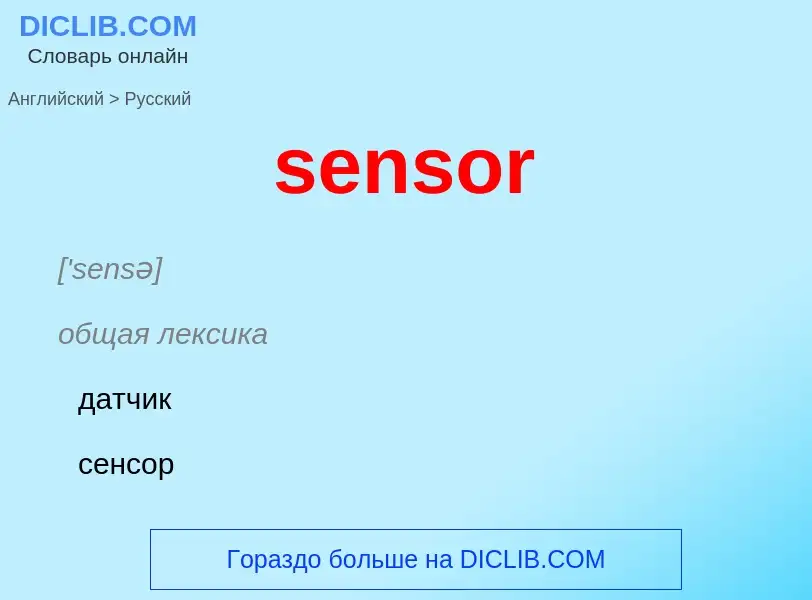Translation and analysis of words by artificial intelligence
On this page you can get a detailed analysis of a word or phrase, produced by the best artificial intelligence technology to date:
- how the word is used
- frequency of use
- it is used more often in oral or written speech
- word translation options
- usage examples (several phrases with translation)
- etymology
sensor - translation to English
['sensə]
общая лексика
датчик
сенсор
рецептор
датчик, чувствительный элемент
датчики бывают дискретные и аналоговые (analog sensor, analogue sensor). Дискретные датчики выдают несколько фиксированных значений, например "включено", "выключено". Аналоговый датчик - устройство, выдающее электрический сигнал реакции на температуру, движение, давление, вибрацию, свет, магнитное поле, на концентрацию определённого химического вещества и т.д.
воспринимающий элемент
средство обнаружения
медицина
зонд-датчик
строительное дело
чувствительный элемент
измерительный преобразователь, датчик
существительное
общая лексика
орган (какого-л.) чувства
чувствительный/воспринимающий элемент
специальный термин
датчик
чувствительный элемент
- anti-intrusion sensor
- anti-personnel sensor
- audible sound sensor
- biometric sensor
- contact sensor
- emission detection sensor
- fence sensor
- fence associated sensor
- fence disturbance sensor
- fibre optic sensor
- heat sensor
- image sensor
- indoor sensor
- interior sensor
- intrusion detection sensor
- non-attended sensor
- optronic sensor
- real-time sensor
- scanning sensor
- tamper sensor
- termal image sensor
Definition
Прибор для измерения ускорений, перегрузок в транспортных машинах, летательных аппаратах и т.п.
Wikipedia

A sensor is a device that produces an output signal for the purpose of sensing a physical phenomenon.
In the broadest definition, a sensor is a device, module, machine, or subsystem that detects events or changes in its environment and sends the information to other electronics, frequently a computer processor. Sensors are always used with other electronics.
Sensors are used in everyday objects such as touch-sensitive elevator buttons (tactile sensor) and lamps which dim or brighten by touching the base, and in innumerable applications of which most people are never aware. With advances in micromachinery and easy-to-use microcontroller platforms, the uses of sensors have expanded beyond the traditional fields of temperature, pressure and flow measurement, for example into MARG sensors.
Analog sensors such as potentiometers and force-sensing resistors are still widely used. Their applications include manufacturing and machinery, airplanes and aerospace, cars, medicine, robotics and many other aspects of our day-to-day life. There is a wide range of other sensors that measure chemical and physical properties of materials, including optical sensors for refractive index measurement, vibrational sensors for fluid viscosity measurement, and electro-chemical sensors for monitoring pH of fluids.
A sensor's sensitivity indicates how much its output changes when the input quantity it measures changes. For instance, if the mercury in a thermometer moves 1 cm when the temperature changes by 1 °C, its sensitivity is 1 cm/°C (it is basically the slope dy/dx assuming a linear characteristic). Some sensors can also affect what they measure; for instance, a room temperature thermometer inserted into a hot cup of liquid cools the liquid while the liquid heats the thermometer. Sensors are usually designed to have a small effect on what is measured; making the sensor smaller often improves this and may introduce other advantages.
Technological progress allows more and more sensors to be manufactured on a microscopic scale as microsensors using MEMS technology. In most cases, a microsensor reaches a significantly faster measurement time and higher sensitivity compared with macroscopic approaches. Due to the increasing demand for rapid, affordable and reliable information in today's world, disposable sensors—low-cost and easy‐to‐use devices for short‐term monitoring or single‐shot measurements—have recently gained growing importance. Using this class of sensors, critical analytical information can be obtained by anyone, anywhere and at any time, without the need for recalibration and worrying about contamination.


![An [[infrared sensor]] An [[infrared sensor]]](https://commons.wikimedia.org/wiki/Special:FilePath/Infrared Transceiver Circuit.jpg?width=200)
